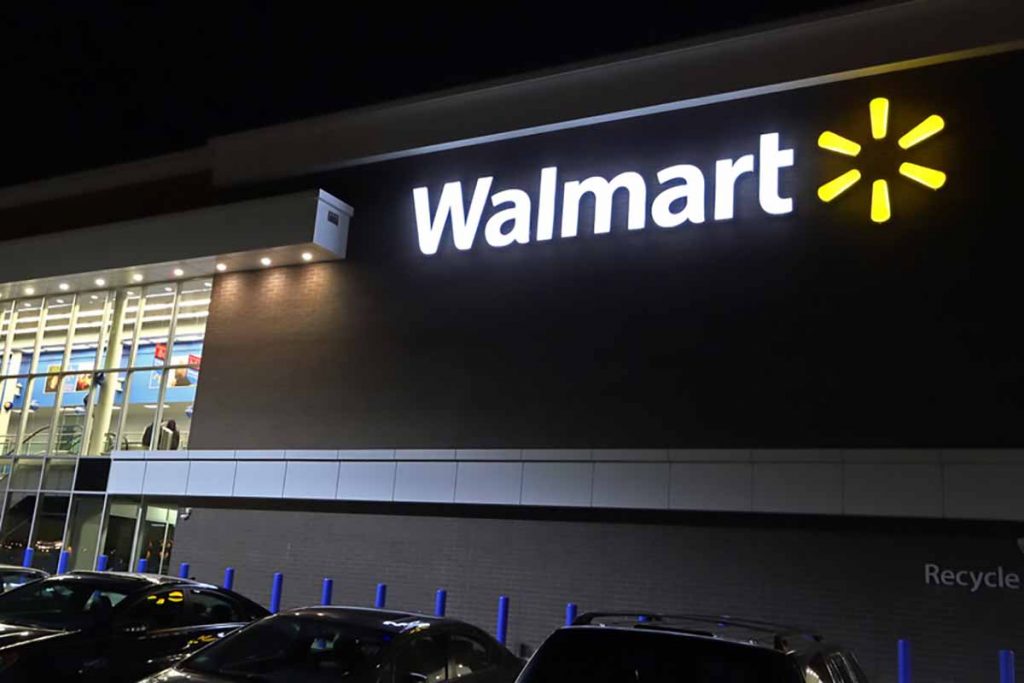
The Greenpeace lawsuit focuses on Walmart’s use of the How2Recycle label on certain of the company’s private label plastic packaging. | QualityHD/Shutterstock
A lawsuit alleging Walmart deceives customers about recyclability of its packaging has been reopened. Attorneys for Greenpeace expect their complaint, which was previously dismissed by a federal judge, will be allowed to move forward in its amended form.
Greenpeace initially filed suit against Walmart in December 2020, arguing that the company falsely promotes certain packaging materials as “recyclable.” The complaint, filed in California’s Alameda County Superior Court, focused on Walmart’s private label packaging made from plastic Nos. 3-7, plastic shrink sleeves, or unidentified plastic.
Greenpeace took issue with the products’ How2Recycle labels, which advise consumers about recycling options for various plastic packaging materials. For the Walmart packaging that the lawsuit focuses on, the labels either identify the material as widely recyclable with certain instructions, or they advise the consumer to check local recycling rules.
But Greenpeace argues that plastics 3-7 are “not recyclable in California because such products are rarely, if ever, recycled.” Greenpeace lays out how many MRFs have historically baled 3-7 plastics together rather than sorting them into individual resin bales. Greenpeace further argues that many of these mixed bales are destined for disposal rather than recycling.
The initial complaint, which was later transferred to the U.S. District Court for the Northern District of California-San Francisco, was dismissed in September. Judge Maxine Chesney ruled that Greenpeace didn’t begin its investigation with a belief that the claims were true. Essentially, she found that Greenpeace wasn’t deceived by the labels, so Greenpeace didn’t have grounds to sue. The environmental group said the judge dismissed the case based on a technicality.
Greenpeace filed an amended complaint on Oct. 15. The amended filing lays out the same background details, making a case that Walmart’s labels mislead consumers into believing the packaging will be recycled.
The Greenpeace-Walmart case is one of several recent recyclability labeling lawsuits filed in California. In a separate case, The Last Beach Cleanup sued TerraCycle and a handful of brands, claiming they were deceiving the public about the availability of recycling options. That lawsuit was recently settled. In another case, a California resident sued Keurig Green Mountain, alleging that the company’s coffee pods are rarely recycled, despite Keurig advertising them as recyclable. That case has reached a tentative settlement.
Details on amended filing
Lexington Law Group, the firm representing Greenpeace, explained the modified filing in a statement to Resource Recycling.
“Greenpeace’s original complaint was premised on Walmart’s misleading and deceptive use of recycling labels on products and packaging that are not recyclable,” said Howie Hirsch, an attorney at the law firm. “The Court previously dismissed those claims due to the Court’s concern that Greenpeace could not plead that Greenpeace relied on Walmart’s recycling labels. The amended complaint cures this perceived deficiency by predicating the case on Walmart’s unlawful failure to substantiate its recycling claims. Because this claim is not tied to anyone’s reliance on Walmart’s recycling labels, we expect the Court to allow the case to proceed.”
The original lawsuit named as defendants an unknown number of unidentified entities. The complaint noted these were defendants whose identities would only become known during the course of the legal action. The amended complaint names only Walmart as a defendant, however.
Walmart responded to the amended complaint on Nov. 10, again asking the court to dismiss the case. Among other arguments, Walmart’s attorneys said the amended complaint’s new focus on the recycling claims being unsubstantiated “is misplaced.”
Greenpeace invokes the Environmental Marketing Claims Act (EMCA), which has been cited in all of the recent recyclability labeling lawsuits, in its complaint. But Walmart’s attorneys argue that the law “does not, as Greenpeace asserts, require advertisers to maintain records that substantiate recyclability claims.”
The text of the law says companies must maintain records supporting the validity of a variety of advertising claims that reference environmental or ecological friendliness or similar terms. The list of marketing claims that trigger the records-keeping requirement does not specify “recyclability,” although it does leave the law open to cover “any other like term.”
As for records-keeping related to recyclability, Walmart’s attorney’s acknowledged that will be a requirement in the coming years, referencing Senate Bill 343, which was signed by the state’s governor in October.
“The Legislature recently passed a bill that would do so, but that law is not yet in effect, is not retroactive, and much of it does not apply until January 2024 at the earliest,” Walmart’s motion stated.
Greenpeace has until Dec. 13 to file a motion opposing Walmart’s request for dismissal of the case.
More stories about courts/lawsuits
- In Brightmark bankruptcy, parent firm wins auction bid
- Oakland recycling contract scheme draws federal scrutiny
- Recycling manager gets prison time for revenue theft


